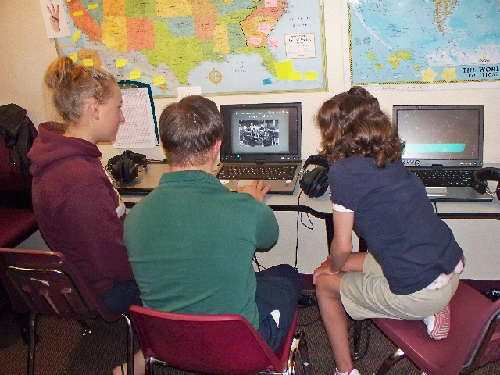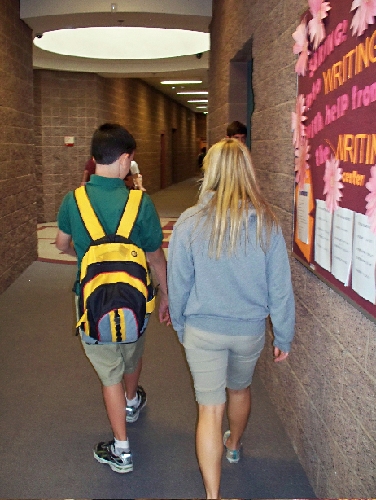Faith Lutheran mentor program pairs high school volunteers with intellectually disabled students
A day at Faith Lutheran High School is different for Billy Wolfbrandt than for most of his classmates. As other kids go to their classes alone, a mentor often joins him in his.
Wolfbrandt is one of five students in the Mark 10:14 program, which the school instituted three years ago to help intellectually challenged students.
"To me, that verse is about welcoming those who the rest of the world doesn't open doors to," Mark 10:14 teacher Lee Segalla said. "There isn't any other school that I know of that has a program like this, certainly not any other private school in our area."
The program started when parents of Mark 10:14 students approached Faith Lutheran Executive Director Kevin Dunning. "He opened the door for us to create the program from nothing really," Segalla said.
Mark 10:14 is a Bible verse in the New Testament: "Let the little children come to me, and do not hinder them, for the kingdom of God belongs to such as these."
According to UNLV special education professor Tom Pierce, three schools in the valley specialize in exclusively teaching students with intellectual disabilities. The Mark 10:14 program approaches the development of challenged students differently than other schools and institutions by integrating them with the general student body.
"Students with disabilities historically are educated in separate classrooms so they wind up being taught with all kids with disabilities," Segalla said. "In our program, they spend all day long with typical kids, and they get to model typical behaviors, which tends to bring them up so that their behaviors become less and less different."
Veering from the traditional ways of teaching such students is an important task for Segalla and co-teacher Julie Grosso.
"Typically, in a special ed classroom, you have a special ed teacher who is taught special ed but is not taught biology or history," Segalla said. "They are getting taught by teachers who are certified in areas of their instruction."
"The research is pretty clear that we know that students with intellectual disabilities always do better socially when they're around typical peers as opposed to around other kids with disabilities," Pierce said.
Students in the Mark 10:14 program are encouraged to participate in extracurricular activities. Wolfbrandt competes on Faith's football and wrestling teams. Bailey Lamonte, a seventh-grader, participated in "Stop That Villain," a play performed in December. Eighth-grader Clayton Rhodes also got into the drama program, performing in Faith's main stage musical, "High School Musical."
This year, the program welcomed high school students as mentors with 15 signing up to help the teachers. With two mentors every block, the students in the program receive more one-on-one attention. The mentor program also enables the mentors to teach the students more than just educational standards.
"They have learned the obvious academic stuff I teach them, but more importantly they have learned interaction with more kids because of the mentor program," senior mentor Paige Fulfer said.
Along with the benefits for the students in the program, the peer mentors also show their friends how to interact with intellectually disabled students, both inside and outside of school.
"A lot of people pull back from anyone or anything that's different," Segalla said. "So if one of our students doesn't speak as clearly, they won't go up and talk to them because they're afraid it will be awkward. But when they see our mentors interacting, it gives them a model for how to interact."
While the mentors give up their time to teach the students, they get a big reward in return.
"My favorite part about working with these kids is the connection I feel with them," Fulfer said. "I have so much fun with them, and we all make each other smile every second we are together. There's never a dull moment."
R-Jeneration


















